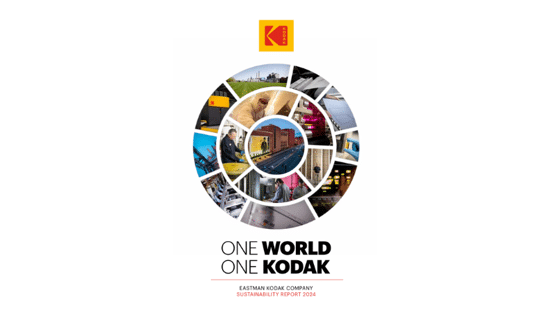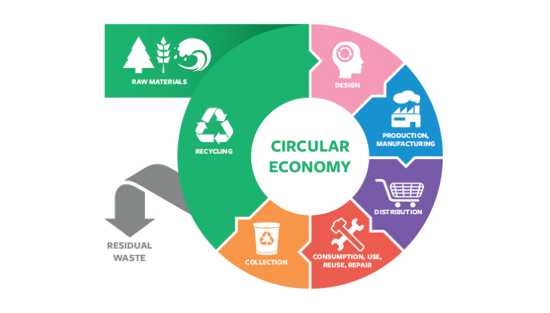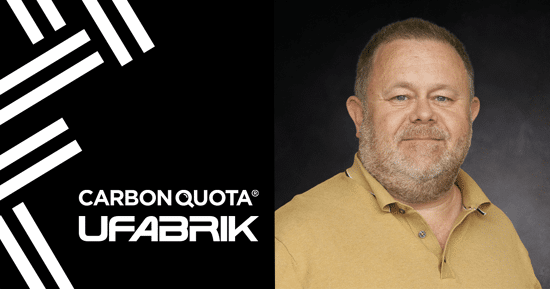Cactus Imaging wins Sustainability Award at the World Out of Home Congress

Large-format print specialists Cactus Imaging won the Sustainability Award at the World Out of Home Congress in Hong Kong. The business was recognised as a global leader in in wide-format sustainability. Its Ecobanner features a PVC-free flexible banner fabric.
The award is a significant win for Cactus Imaging and has positioned the business as a world leader in wide-format sustainability. Keith Ferrel and Nigel Spicer have led the strategy and development of the project for the PVC-free flexible banner fabric, which offers a 100% capable closed-loop recycling solution for large-format billboard advertising.
The Ecobanner material was developed in conjunction with Gale Pacific and is available to all print businesses to use, ensuring that everyone has the opportunity to use it.
It prints on all the Cactus large format equipment. The aim is to have up to 80% of all billboards printed on this material. The width of the rolls is the only factor preventing Cactus from being more widely used, as the roll size is up to 3.5 metres. It may take up to a year before this can be increased to 5 metres wide.
 Caption: Out of home global sustainable leader: Ecobanner by Cactus Imaging. Credit: Cactus Imaging.
Caption: Out of home global sustainable leader: Ecobanner by Cactus Imaging. Credit: Cactus Imaging.
Traditional PVC-based banner materials have proved very suitable at holding the ink, providing the base for vibrant images, and is able to withstand harsh outdoor elements; however, they are environmentally problematic. The new Ecobanner, developed by Cactus, offers the same print fidelity and characteristics as traditional media, but can be recycled, rather than resulting in landfill.
The sustainable banner initiative was under oOh!’s Environmental, Social, and Governance team, in partnership with Cactus Imaging, which required a large format Out of Home solution that met the evolving sustainability demands of agencies and advertisers.
 Caption: Ecobanner from Cactus: Global sustainability winner. Image credit: Ecobanner
Caption: Ecobanner from Cactus: Global sustainability winner. Image credit: Ecobanner
The material was first used during the FIFA Women's World Cup in 2023 at the iconic Glebe Island Silos. “Our collaboration with Gale Pacific on Ecobanner demonstrates how innovation and sustainability can coexist, driving the Out of Home sector toward a more sustainable future. We are delighted to receive this honour in a category that celebrates the achievements being done in sustainability by OOH peers around the world.”
Topics
Recent news

Kodak's 2024 Sustainability Report: A Commitment to a Greener Future
Kodak's 2024 Sustainability Report, "One World, One Kodak," demonstrates a strong commitment to environmental and social responsibility. The report highlights impressive reductions in greenhouse gas emissions (56%) and water withdrawal (31%) and aims for zero waste by 2025. Notably, Kodak is pioneering double materiality assessment in the printing industry, aligning sustainability with financial reporting, and showcasing its products' environmental benefits.

How can printers lower costs on energy usage?
Clare Taylor outlines simple steps for businesses to achieve energy sustainability, focusing on cost savings and staff comfort. It emphasises starting with measuring energy consumption to identify key areas for improvement. Subsequent steps involve managing energy use through behavioral changes and low-cost interventions, like optimizing cooling settings and ensuring equipment is switched off when not needed.

The European Union's circular economy plan
Printing companies must understand the EU's Circular Economy Action Plan (CEAP), part of the European Green Deal. These initiatives drive sustainability, impacting businesses globally, even if not EU-based, through customer requirements. Printers need to be aware of reporting and sustainability expectations to manage risks and retain clients.

A revised look at sustainability in wide format print
Sustainability is crucial for wide-format print, moving beyond marketing to an imperative driven by brands and regulations. Common "eco" claims often mask complexities; true sustainability demands carbon reduction as a core principle. Life Cycle Assessment (LCA) offers data-driven insights for genuine environmental improvement, as demonstrated by UFABRIK's transparent approach.